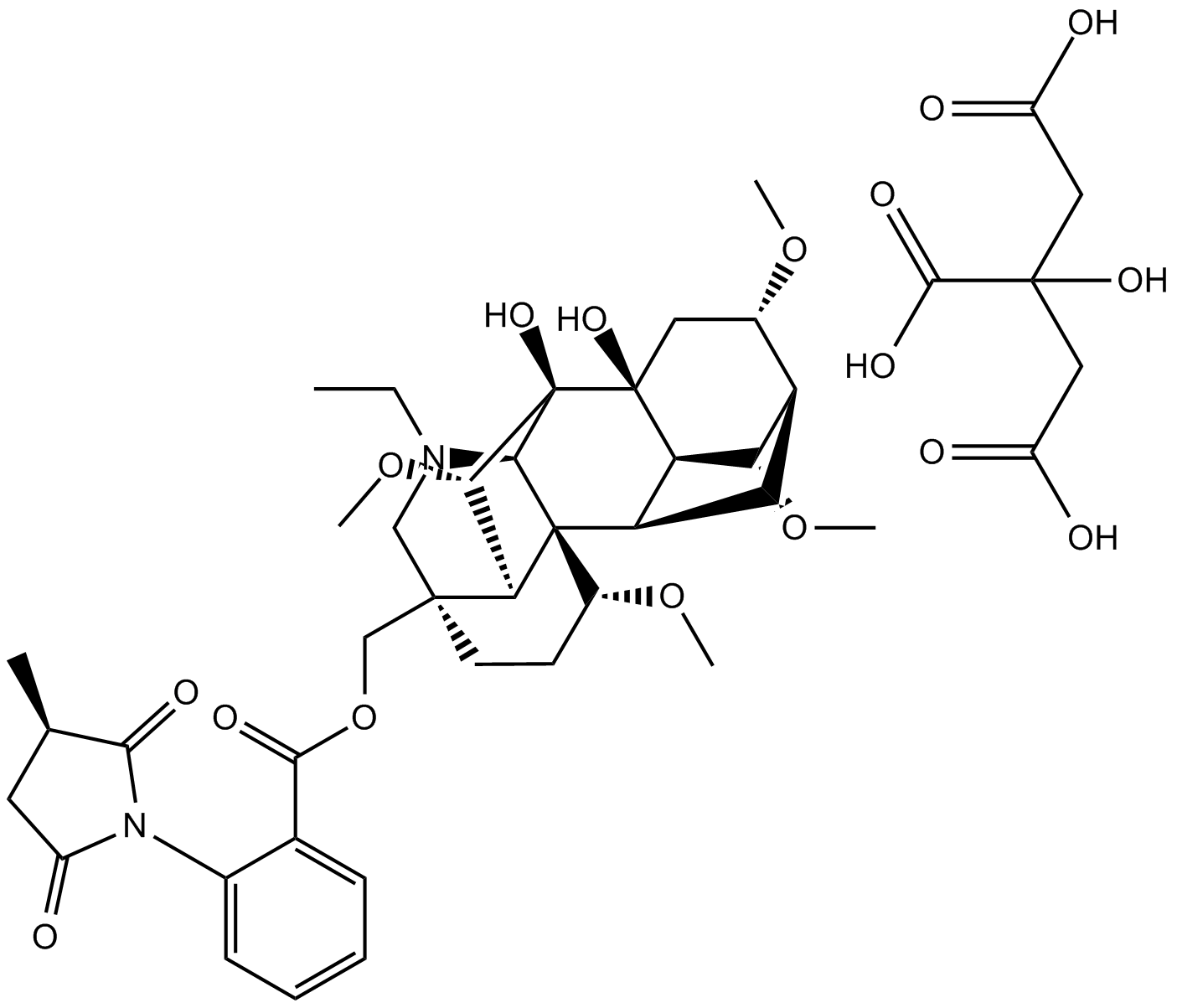Methyllycaconitine citrate (Synonyms: MLA) |
| Catalog No.GC13678 |
델피니움 브라우니의 씨앗에서 분리된 노르디테르페노이드 알칼로이드인 메틸리카코니틴 시트레이트(MLA)입니다.
Products are for research use only. Not for human use. We do not sell to patients.

Cas No.: 112825-05-5; 351344-10-0
Sample solution is provided at 25 µL, 10mM.
Methyllycaconitine citrate (MLA), a norditerpenoid alkaloid isolated from the seeds of Delphinium brownie. Methyllycaconitine citrate (MLA) is an antagonist of α7-containing neuronal nicotinic acetylcholine receptors (α7nAChR)[2].
Pretreatment with 5 and 10 uM MLA inhibited the decreased cell viability induced by Aβ25-35, which suggested that MLA had a protective effect against Aβ-induced cytotoxicity. Furthermore, cell viability did not decrease after exposure to MLA (2.5, 5, 10, 20 uM), which suggests a good safety profile[1].Because of Methyllycaconitine citrate (MLA) is specific, concentration-dependent, reversible, and voltage-independent antagonism, it could inhibit acetylcholine- and anatoxin-induced whole-cell currents in cultured fetal rat hippocampal neurons[3].
When test the influence of Methyllycaconitine citrate on acute METH effects and neurotoxicity in mice, using both in vivo and in vitro models. MLA inhibited METH-induced climbing behavior by 50%. Acute effects after 30-min preincubation with 1µM METH also included a decrease in striatal synaptosome dopamine (DA) uptake, which was prevented by MLA. METH-induced neurotoxicity was assessed in vivo in terms of loss of striatal dopaminergic terminals (73%) and of tyrosine hydroxylase levels (by 90%) at 72 h post-treatment, which was significantly attenuated by MLA[4]. 50 nM Methyllycaconitine citrate partially inhibited (by 16%) [(3)H]dopamine release from rat striatal synaptosomes stimulated with 10 microM nicotine. Other alpha7-selective antagonists had no effect. Similarly, Methyllycaconitine citrate (50 nM) inhibited [(3)H]dopamine release evoked by the partial agonist (2-chloro-5-pyridyl)-9-azabicyclo[4.2.1]non-2-ene (UB-165) (0.2 microM) by 37%[5]. Methyllycaconitine citrate was administered to animals allowed to self-administer nicotine intravenously, and also to animals that had been prepared with nicotine-containing osmotic mini-pumps and trained on a brain stimulation reward procedure. The results indicated that pretreatment with the highest doses of MLA used (3.9 and 7.8 mg/kg) significantly reduced nicotine self-administration at two doses of self-administered nicotine (0.03 and 0.06 mg/kg/infusion) [6]. Vaccination altered methyllycaconitine toxicity in mice and that vaccination may be useful in decreasing the effects of larkspur toxins in animals[7].
References:
[1]. Zheng X, Xie Z, et,al. Methyllycaconitine alleviates amyloid-β peptides-induced cytotoxicity in SH-SY5Y cells. PLoS One. 2014 Oct 31;9(10):e111536. doi: 10.1371/journal.pone.0111536. PMID: 25360664; PMCID: PMC4216102.
[2]. Kalappa BI, Sun F, et,al. A positive allosteric modulator of α7 nAChRs augments neuroprotective effects of endogenous nicotinic agonists in cerebral ischaemia. Br J Pharmacol. 2013 Aug;169(8):1862-78. doi: 10.1111/bph.12247. PMID: 23713819; PMCID: PMC3753841.
[3]. Alkondon M, Pereira EF, et,al. Blockade of nicotinic currents in hippocampal neurons defines methyllycaconitine as a potent and specific receptor antagonist. Mol Pharmacol. 1992 Apr;41(4):802-8. PMID: 1569927.
[4]. Escubedo E, Chipana C, et,al. Methyllycaconitine prevents methamphetamine-induced effects in mouse striatum: involvement of alpha7 nicotinic receptors. J Pharmacol Exp Ther. 2005 Nov;315(2):658-67. doi: 10.1124/jpet.105.089748. Epub 2005 Aug 2. PMID: 16076935.
[5]. Mogg AJ, Whiteaker P, et,al.Methyllycaconitine is a potent antagonist of alpha-conotoxin-MII-sensitive presynaptic nicotinic acetylcholine receptors in rat striatum. J Pharmacol Exp Ther. 2002 Jul;302(1):197-204. doi: 10.1124/jpet.302.1.197. PMID: 12065717.
[6]. Markou A, Paterson NE. The nicotinic antagonist methyllycaconitine has differential effects on nicotine self-administration and nicotine withdrawal in the rat. Nicotine Tob Res. 2001 Nov;3(4):361-73. doi: 10.1080/14622200110073380. PMID: 11694204.
[7]. Lee ST, Stegelmeier BL,et,al. Evaluation of vaccination against methyllycaconitine toxicity in mice. J Anim Sci. 2003 Jan;81(1):232-8. doi: 10.2527/2003.811232x. PMID: 12597394.
Average Rating: 5 (Based on Reviews and 17 reference(s) in Google Scholar.)
GLPBIO products are for RESEARCH USE ONLY. Please make sure your review or question is research based.
Required fields are marked with *




















